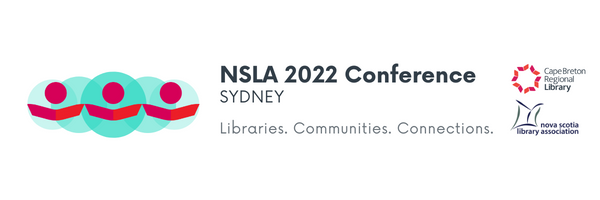
Code of Conduct
Introduction
NSLA is an association for those involved in librarianship/library and information studies at all levels and in all regions in Nova Scotia. Its purpose is to facilitate the exchange of ideas, and to promote a forum for the discussion of issues amongst people concerned with library and information services.
The Nova Scotia Library Association (NSLA) is proud of the professional development that occurs at our professional development workshops and the annual Conference. As such, NSLA is dedicated to providing a positive event experience for all participants and expects attendees, speakers, exhibitors, volunteers, and staff to show respect and courtesy toward one another at all NSLA events. We value ideas, thoughts and expression, and we appreciate new pedagogy when delivering workshops and sessions. Discriminatory language and imagery is not appropriate for any event venue, including talks, workshops, sessions, or any community event online or in a face-to-face environment. Violating the tenet of “confidentiality” in any way is unacceptable.
Purpose
Harassment
We do not tolerate harassment in any form. Harassment is understood as any behaviour that threatens another person or group, or produces an unsafe environment. It includes offensive verbal comments or nonverbal expressions related to gender, gender identity, gender expression, sexual orientation, disability, physical appearance, body size, race, age, religious beliefs, sexual or discriminatory images in public spaces (including online), deliberate intimidation, stalking, following, harassing photography or recording, sustained disruption of talks or other events, inappropriate physical contact, and unwelcome sexual attention. Participants asked to stop any harassing behaviour are expected to comply immediately. If a participant engages in harassing behaviour, the conference organizers may take any action they deem appropriate, including warning the offender or expulsion from the conference with no refund. We expect participants to follow these rules at conference and workshop venues and conference-related social events.
Confidentiality
All participants are expected to adhere to confidentiality, and will not publicly name individuals when discussing anecdotal information [The exception to this is when express permission has been provided and is stated as part of the commentary].
Procedures
If you are being harassed, notice that someone else is being harassed, believe confidentiality has been compromised, or believe that this code of conduct has been breached in any way, please contact a member of the conference staff immediately. Conference staff will be identified at the beginning of each session and will be located at the conference registration desk, or available virtually. If you believe someone is in physical danger, please notify appropriate law enforcement first. Conference staff will be able to help participants contact hotel/venue security or local law enforcement, provide escorts, or otherwise assist those experiencing harassment to feel safe for the duration of the conference.
Conference Staff Procedure for Handling Code of Conduct Violation Reports
Please note that all accusations are considered to be allegations, until the appropriate investigation has been completed, and a determination has been reached. If there is a general threat to attendees or the safety of anyone is in doubt, summon hotel/venue security or police immediately. If an incident is reported that does not pose an immediate threat, gather the following information about the incident:
- Name of participant accused of violating the Code of Conduct
- Names of other people involved in, or witness to, the incident
- Behaviour that contravenes the Code of Conduct
- Approximate time of the incident
- Circumstances surrounding the incident
If an incident is reported to conference staff, they will meet with the conference chair and/or event coordinator to determine whether action is required. Possible actions that may be required include:
- Informing the accused of what has been reported and allowing them to provide their side of the story;
- Warning the accused to cease the behaviour;
- Requiring that the accused avoid any interaction with and/or physical proximity to the other party for the remainder of the event;
- Ending a talk early that contravenes the code of conduct;
- Not publishing the video or slides of a talk that contravened the code of conduct;
- Not allowing a speaker who contravened the Code of Conduct to give further talks at the event, or future NSLA events;
- Immediately ending any event responsibilities or privileges the accused holds;
- Requiring that the accused not participate in future NSLA events;
- Requiring that the accused immediately leave the event and not return;
- Removing the accused from NSLA membership.
Only permanent resolutions, such as bans, may be appealed. To appeal a decision, send an email to the current NSLA President. Contact information can be found at the NSLA website.
PLEASE NOTE: This has been adapted from the Ontario Library Association Code of Conduct for OLA Events, the APLA Event Code of Conduct, and the Code4Lib Creative Commons Conference Code.